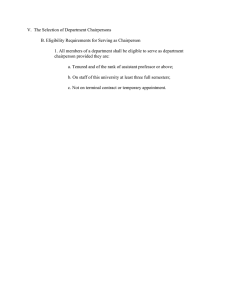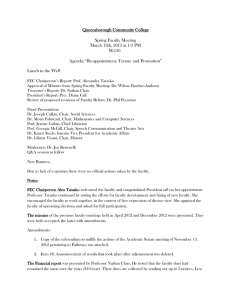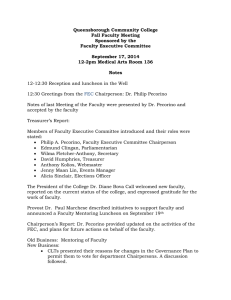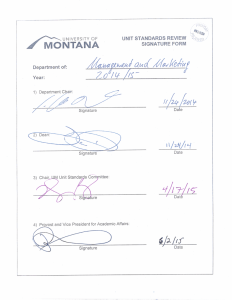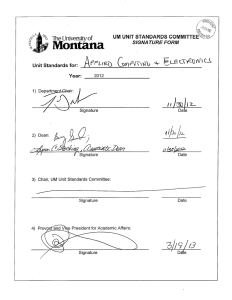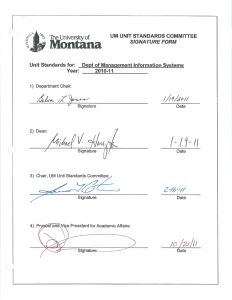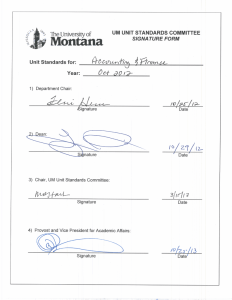Document 11936764
advertisement
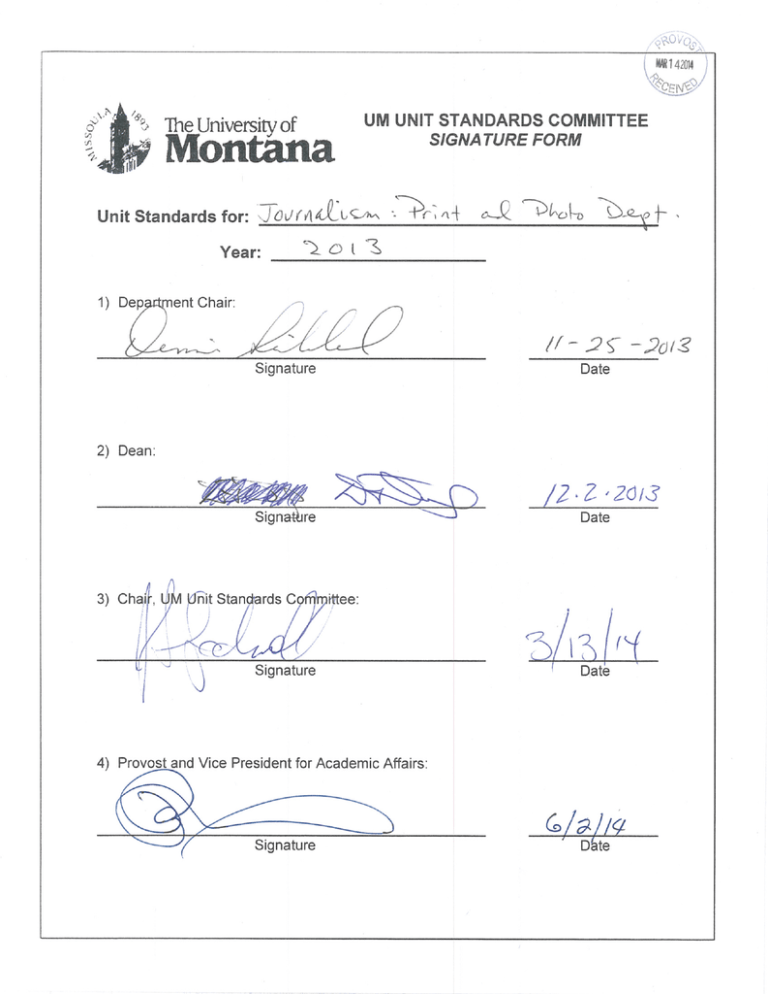
UNIT STANDARDS AND PROCEDURES FOR FACULTY TENURE, PROMOTION, RETENTION AND SALARY DECISIONS DEPARTMENT OF PRINT AND PHOTO JOURNALISM SCHOOL OF JOURNALISM The department is guided by the standards and procedures established in the Collective Bargaining Agreement as a general statement of policy on tenure, promotion, retention and salary decisions. These standards are intended to be consistent with and in addition to the CBA’s provisions. In the event of any omission or inconsistency in this document, the CBA shall apply, but the unit standards will prevail when its provisions are more rigorous than those of the CBA. Faculty members are encouraged to consult Section 10 of the CBA for guidance on the evaluation procedures beyond those described here, especially the process for appeal. I. GENERAL CRITERIA FOR INITIAL APPOINTMENT New hires are expected to have a broad knowledge of journalism, strong professional experience, a commitment to teaching, and an active interest in professional creative activity or scholarly research. New hires must have at least a master’s degree in journalism or a related field, which is considered the School of Journalism’s terminal degree. In extraordinary circumstances, extensive or especially distinguished professional experience may be considered in lieu of a master’s degree. II. ACADEMIC FREEDOM AND RESPONSIBILITY A. The School of Journalism is deeply committed to academic freedom. The welfare and strength of democracy depends largely on the free search for truth and its free expression, without hindrance, restriction, equivocation and administrative reprisal. (See CBA Section 6.100) B. Faculty members are expected to behave in a professional manner toward their colleagues in the unit and in the academic community. Faculty shall not be subject to, or subject others to, abuse, threats, intimidation, bullying or discrimination. Each faculty member is expected to participate in the work of the unit and the institution. (See CBA Section 6.200) III. PROCEDURES FOR TENURE, PROMOTION, RETENTION AND SALARY EVALUTION A. Faculty shall maintain a current and complete Individual Performance Record of their teaching effectiveness, their service, and their research or creative activities. The IPR shall include any material deemed pertinent to the annual review with respect to tenure, promotion, retention, and salary decisions. B. The Faculty Evaluation Committee comprises all tenured and tenurable faculty members of the School of Journalism. It shall meet annually to make tenure, promotion, retention and salary recommendations. No faculty member shall participate in such recommendations affecting her or his own evaluation. The FEC shall elect a chairperson from among those members of the school’s tenured faculty who are not also serving as department chairperson. The FEC’s recommendation on matters of promotion and tenure shall be based on a majority vote of all committee members. That decision shall be communicated by the FEC chairperson to each faculty member under review, who shall have a right to respond. C. The FEC shall nominate and elect the chairperson and members of the Student Evaluation Committee. The SEC chairperson has the right to attend the FEC meeting and explain its findings, which must represent the prevailing student opinion of each faculty member’s teaching effectiveness, based on course evaluations and interviews with students in those courses. D. The FEC may receive or seek evidence from any source, including tenured and tenure-track faculty, non-tenure track faculty and students, that is relevant to the evaluation of any faculty member in the academic unit so long as the evidence is relevant to the approved unit standard. Any evidence relied upon for evaluation purposes is incorporated into the record, and the faculty member to whom the evidence pertains is afforded full opportunity to review and respond to the evidence in accordance with the CBA. Unsolicited materials may not be used as part of the evaluation process unless they are signed. Authors of unsolicited materials have no expectation of confidentiality. (See CBA Section 10.230.) E. The FEC and the department chairperson shall prepare separate recommendations on each faculty member under review and transmit them, along with the IPRs, according to the procedure detailed in the CBA. Faculty members being evaluated shall sign the separate recommendations of the SEC, FEC and the department chair. The signature does not signify the faculty member’s endorsement of the recommendations. The faculty member may request a meeting with the FEC chairperson, the FEC and/or the department chairperson for clarification of the recommendations. IV. TEACHING, SERVICE AND SCHOLARSHIP STANDARDS FOR PROMOTION, TENURE AND SALARY DECISIONS A. Standards for Normal Performance in Teaching 1. Good teaching is the primary obligation of all faculty members, and the quality of teaching must be evaluated regularly. 2. Normal performance in teaching includes but is not limited to: a. b. c. d. e. f. g. h. Meeting classes regularly. Advising students competently. Being available to students during office hours and by appointment. Receiving an average rating of a least 3.0 to questions on the school’s course evaluation forms regarding overall teaching effectives. Revising and updating courses periodically. Teaching both lower- and upper-division courses, as assigned. Serving regularly as chairs or members of graduate student committees. Teaching courses that serve the University’s general student population, when assigned. 3. Above normal or outstanding teaching is indicated by awards, honors, grants, invitations to partner or collaborate with prestigious media organizations, or other recognition from outside the unit of innovative or exceptional teaching, including recognition of student work produced under a faculty member’s supervision. In deciding whether teaching is considered above normal or outstanding, the FEC will consider the prestige and magnitude of the recognition. B. Standards for Normal Performance in Service 1. The department expects that each faculty member will be engaged in service. The three categories of service include service to the department and university, to the profession, and to the community at large. 2. Normal performance in service is defined as participation each year in at least two of the service categories listed above. 3. Above normal or outstanding service is indicated by awards, honors, grants or other recognition from outside the department. In deciding whether service is considered above normal or outstanding, the FEC will consider the prestige and magnitude of the recognition. C. Standards for Normal Performance in Scholarship or Creative Activity 1. The department expects each faculty member to produce scholarship or works of journalism or related creative activity. Documentation of normal scholarly or creative activity may include a title-author page; a draft of an article or manuscript; a script or rough cut of an audio, video or multimedia work; a letter or contract accepting such work for professional or academic dissemination. Consistent normal performance in scholarship or creative activity shall not by itself be sufficient for tenure or promotion. 2. Normal performance in scholarship or creative activity is defined as producing one work per year, on average. Indicators of normal work include, but are not limited to, the examples below, which are not ranked. a. b. c. d. e. f. g. h. Articles, columns, reviews, photos, books subject to editorial vetting or critical review before publication in the popular press or by online publications. Major production credits (executive producer, producer, director, writer, researcher, reporter, photographer or editor) in television or radio features aired by public or commercial outlets. Photo or multimedia exhibits or gallery showings. Articles, monographs, reviews or professional papers selected for presentation at academic or professional conferences or publication in an academic or professional journals. Consulting work related to journalism. Invitations to lecture on topics related to journalism. Drafts, chapters or rough cuts of professional or scholarly works in progress. Grants awarded in support of scholarly or professional works in progress. 3. Above normal or outstanding scholarship shall be indicated by showing that the activity was highly regarded outside the unit. In deciding whether such activity is to be considered above normal or outstanding, the FEC will consider the prestige and magnitude of the professional or academic recognition. Evidence of circulation, ratings, web traffic or viral promotion will not, by itself, suffice. Indicators include but are not limited to: a. b. c. d. e. Distinguished awards or honors. Favorable reviews that are published or broadcast by distinguished media organizations or academic publications. Invitations from distinguished media or academic organizations to exhibit, republish or rebroadcast the work. Letters describing the work’s quality from those who published (or broadcast, or exhibited, etc.) Invitations or agreements from distinguished media organizations or academic organizations submit future work. D. The Promotion Decision 1. Except in unusual circumstances, four or more years of full-time service as Assistant Professor are required before the date of promotion to Associate Professor (application may be during the fourth year in rank). Except in unusual circumstances, five or more years of full-time service in rank as an Associate Professor are required before the date of promotion to Professor (application can be made in the fifth year in rank). 2. Promotion to Associate Professor shall be recommended by the FEC and FEC chair if the applicant’s record demonstrates their increasing value of the faculty member’s teaching, service and in scholarship or creative activity to the School of Journalism and to the University. 3. Promotion to Full Professor may not be made on the strength of the faculty member’s teaching and service alone. The applicant must also offer a record of progressively distinguished scholarship or creative activity. 4. The completion of the required number of years in rank shall not by itself be grounds for promotion. 5. Documentation in the IPR shall cover every year of service in the current rank. E. The Tenure Decision 1. Faculty members who possess five years of credit toward tenure (no more than three years of which may be credited to another institution), a master’s degree, and the academic rank of Associate Professor shall be considered for tenure status upon application. A faculty member may seek tenure and promotion to Associate Professor simultaneously. 2. To achieve tenure the department expects at least normal performance in service and evidence of at least above-normal performance in teaching and scholarship or creative activity during some years of the probationary period. 3. The CBA in Section 9:320 required documentation over the entire probationary period and a vita of publication and/or creative works. F. The Merit Decision 1. A merit recommendation shall be based on above-normal performance in at least two of the three areas (teaching, service, scholarship/creative activity) and normal performance in the third area, or outstanding performance in at least one area and normal performance in the remaining two, according the standards established above. 2. Documentation for the merit request shall be as described in the CBA (Section 10.210). G. The Less-Than-Normal Decision 1. A recommendation for a less-than-normal salary increase is appropriate for unsatisfactory performance in one or more of the three categories of teaching, service, and scholarship/creative activity. V. NON-RETENTION RECOMMENDATION A non-retention recommendation for probationary appointees shall be made as described by the CBA (Section 9.340). VI. EVALUATION OF NON-TENURABLE FACULTY MEMBERS Non-tenurable adjuncts are hired on an as-needed and course-by-course basis by the department chair in consultation with the dean. A. Adjunct faculty members are evaluated by their students with the department’s course evaluation forms. The department chair reviews those evaluations for evidence of the quality and effectiveness of each adjunct’s teaching. The department chair may supplement such information by observing classes or interviewing students. The department chair then writes a brief evaluation of each adjunct. VII. AMENDMENT A. Any tenured or tenure-track faculty of the department may request a meeting of the faculty to consider changing these standards and procedures. B. Before their use in the evaluation process, amendments require majority approval of the department’s tenured and tenure-track faculty, approval of the University Unit Standards Committee, the Dean of the School of Journalism, and the Provost. The amendments take effect in the academic year following the Provost’s approval. VIII. EVALUATION OF CHAIRS A. The FEC shall review annually the effectiveness of the performance of the department chairperson. B. The views of all tenured and tenurable faculty members in the unit shall be solicited and considered in the evaluation. The chairperson shall have a right of response. C. The FEC chairperson shall prepare an evaluation that represents the majority opinion of the FEC and transmit it to the dean. D. Criteria for evaluation of the chair shall include leadership, support for faculty efforts, openness in communications and decision-making, and administrative competence and efficiency.
